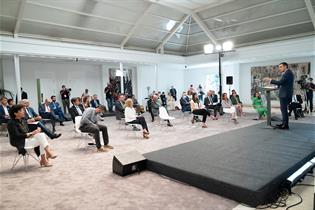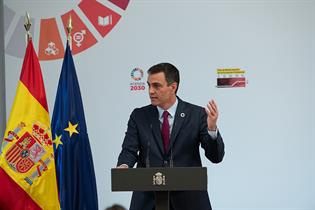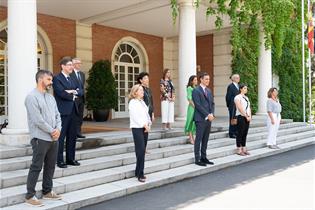Pedro Sánchez presents Plan to Modernise Vocational Training, with a provision of 1.5 billion euros
President's News - 2020.7.22
Moncloa Palace, Madrid
This Plan to Modernise Vocational Training also seeks to provide a response to the growing offer of job positions that require intermediate qualifications. In fact, the unemployment rate among young people with a vocational training qualification is lower than the average but, despite this, our country has a lower proportion of people enrolled on vocational training programmes than other OECD countries.
As Pedro Sánchez highlighted when presenting the Plan, "when we speak about vocational training, we are speaking about jobs and training, about creating wealth, driving business, companies and social well-being".
Also present at the presentation event, held at Moncloa Palace, were Nadia Calviño, Third Vice-President of the Government and Minister for Economic Affairs and Digital Transformation; Teresa Ribera, Fourth Vice-President of the Government and Minister for Ecological Transition and Demographic Challenge; Isabel Celaá, Minister for Education and Vocational Training; Antón Costas, Professor of Economic Policy at Barcelona University; José Ignacio Goirigolzarri, Chairman of Bankia; Inés Juste, from the Juste Group; José Antonio Pose, lecturer at Santiago de Compostela IES Technical University; and Alba Andújar, vocational training student at Santiago de Compostela IES Technical University, among other leading figures in the field of education, employment and business.
1.5 billion euros in investment for largest vocational training plan ever introduced in Spain
 Pool Moncloa/Borja Puig de la BellacasaThe Plan to Modernise Vocational Training focuses on actions in 11 strategic areas that seek to create an eco-system to re-launch the economy through a commitment to human capital and talent. This is an ambitious goal that requires a major allocation of resources - the Plan has a budget of 1.5 billion euros over the next four years, the largest ever amount allocated to a vocational training plan in Spain.
Pool Moncloa/Borja Puig de la BellacasaThe Plan to Modernise Vocational Training focuses on actions in 11 strategic areas that seek to create an eco-system to re-launch the economy through a commitment to human capital and talent. This is an ambitious goal that requires a major allocation of resources - the Plan has a budget of 1.5 billion euros over the next four years, the largest ever amount allocated to a vocational training plan in Spain.
This Plan is the first one designed on a unique system of vocational training through its incorporation in the education system and for employment. And this unique system is precisely one of the principles on which the Plan is based. Another of the pillars is permanent public-private collaboration, which as Pedro Sánchez stressed, "you cannot have quality vocational training without business".
These 1.5 billion euros may be extended with funding from the European Union recovery plan, which will allow new training actions in the field of the internationalisation of vocational training. For example, there will be bilingual qualifications in English, French and German, as well as an international vocational training option, with stays in foreign centres with qualifications that are valid in different countries.
Permanent procedure for accrediting skills
Among the 11 strategic areas on which the Plan is developed is the government's commitment to a permanent procedure to recognise and accredit vocational skills acquired during work experience.
The aim is to accredit the skills of 40% of the active working population under the age of 55 by the year 2023, which equates to 3.35 million beneficiaries. This includes plans to accredit skills by sector and by company with the collaboration of the trade unions and business organisations.
A unique system of flexible and easily accessible vocational training
 Pool Moncloa/Borja Puig de la BellacasaIn addition, this Plan will serve to facilitate tailored training paths through the introduction of a modular offer of personalised vocational training that allows enrolment on one or several modules according to education and labour needs, without having to study all those modules that comprise a qualification or a specialised course. The document also contains a la carte training for companies through programmes for their workforces in collaboration with the industrial sector.
Pool Moncloa/Borja Puig de la BellacasaIn addition, this Plan will serve to facilitate tailored training paths through the introduction of a modular offer of personalised vocational training that allows enrolment on one or several modules according to education and labour needs, without having to study all those modules that comprise a qualification or a specialised course. The document also contains a la carte training for companies through programmes for their workforces in collaboration with the industrial sector.
Furthermore, the strategy develops the interest in boosting vocational training in "empty Spain", by increasing the number of Aulas Mentor (non-regulated online training programmes aimed at people over the age of 18 in rural areas) to extend to as many as 3,000 municipalities.
200,000 new places over next four years
This Plan to Modernise Vocational Training will promote the increase in 200,000 places in the vocational training offer from now until 2023, to offer a response to the growing demand for these subjects and the training needs of the labour market. It will also design a training plan for workers and the unemployed, with the collaboration of regional authorities, Chambers of Commerce, business organisations and trade unions.
The team headed up by Isabel Celaá at the Ministry of Education and Vocational Training plans, furthermore, to draw up a Vocational Training Map and a specific map of the digital needs for vocational training in collaboration with the productive sectors.
New qualifications on Artificial Intelligence, 'Big Data' and Cyber-security
As regards the offer of qualifications, in addition to the modernisation of pre-existing qualifications, the range of qualifications related to digitalisation and new technologies will be increased. Noteworthy among these are Intelligent Manufacturing, the Digitalisation of Industrial Maintenance, Cyber-security in Production Environments, Cyber-security in IT Environments, Railway Signalling and Telecommunications.
 Pool Moncloa/Borja Puig de la BellacasaThe publication of other new titles in the next academic year 2020-2021 is also planned, such as Video Games, 3D Additive Manufacturing, the Implementation of 5G Infrastructures, Artificial Intelligence, Big Data and Building Information Modelling (BIM).
Pool Moncloa/Borja Puig de la BellacasaThe publication of other new titles in the next academic year 2020-2021 is also planned, such as Video Games, 3D Additive Manufacturing, the Implementation of 5G Infrastructures, Artificial Intelligence, Big Data and Building Information Modelling (BIM).
The Plan includes the introduction of a training module in digitalisation applied to each productive sector for all the qualifications on the list. It also provides for the creation of a 30-hour digitalisation module aimed at employees to be taught in companies, with the aim of reaching 125,000 workers a year until 2023. It also seeks to teach digitalisation training to close to 50,500 vocational training teachers over the next two years.
Entrepreneurship and Innovation in Vocational Training and in Dual Vocational Training
This Plan seeks to boost the creation of entrepreneurship classrooms at a total of 1,850 vocational training centres around the country, with the aim of offering students resources and advice that helps them get their projects up and running. It also provides for the promotion of projects for the conversion of vocational training classrooms into applied technology spaces and the creation of the FPConecta platform for relations and exchanges between different vocational training centres, companies, social stakeholders and education authorities.
As regards Dual Vocational Training, which combines classroom training with work experience at work centres, the government is committed to increasing the number of companies in each sector, including SMEs and micro-SMEs, the vocational training eco-system and the extension of the duration of the training model at work centres.
Non official translation





